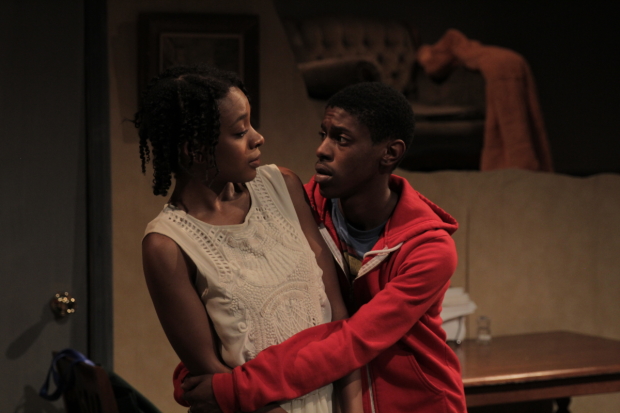Come Back Up
Sarah M. Duncan blends racial commentary with a fantastical tale of a bereaved mother in her world premiere drama with Sanguine Theatre Company.

(© PJ Norton)
Come Back Up, a new play by Sarah M. Duncan making its world premiere with Sanguine Theatre Company at the Gym at Judson, is a compelling story of loss and grief drowned in fantastical plot lines and heavy-handed political statements. Duncan sermonizes on a variety of headline-making topics from a racist legal system to same-sex parenting in the context of a preternatural "forgiveness fable." All of her commentary is timely and aptly set within the middle-class environs of Peoria, Illinois, but each time a social statement rears its head, we can feel ourselves being ushered out of Duncan's imagination and into a lecture hall.
Based in a world of magical realism, a blonde, blue-eyed woman named Clara (Nicole Kontolefa) experiences psychic premonitions of danger that lead her to the doorstep of her African-American ex-girlfriend Letta (Tai Verley) — though first to Letta's rooftop where Clara finds her dangerously sleepwalking. Fortunately, Clara makes it there in time to guide her safely indoors. Letta lives in a modest suburban home (an open, unit set designed by Derek Miller) with her intellectually disabled teenage son Buddy (JT Tarpav), who, tellingly of the trio's history, refers to their houseguest as "Momma Clara." Despite Letta's requests for Clara to leave — not to mention angry phone calls from Clara's new girlfriend Jessamyn — she stays and eventually confirms her suspicions of trouble when the deaths of two local children link back to Buddy.
Without revealing too many details, Buddy's part in these crimes is in no way malicious. Tarpav portrays a sympathetic Lennie Small type whose heart outweighs his intellect. However, according to Letta, there is no sympathy for people like him in the criminal justice system. "The world is cruel to black men, and prison is far worse," she says. There's no reason not to take Letta's word for it, as Verley convincingly plays her as a shrewd woman hardened by life's betrayals and disappointments. But her word alone — which itself is disappointingly generic for someone who claims to have so much insight — is not enough to make us share in her urgent insistence that involving police is not an option. Nonetheless, it's convincing enough for Clara (played by Kontolefa as a woman of infinite compassion), who agrees to keep quiet and goes to extremes to keep her out-of-touch Caucasian girlfriend Jessamyn (a sharp-edged Amber Bogdewiecz) quiet as well. Her motivations also stem from some lingering feelings for Letta and guilt for her tangential part in this whole mess. Buddy's questionable actions have all been in the name of releasing to heaven the spirit of his 11-years-deceased sister Hatty (portrayed as an earth-roaming ghost by the charming Amber Avant). The blame for Hatty's death has been placed on Clara, hence her estrangement from Letta and her pseudo-maternal role in the household from which she has been long absent.
It's a complicated web of plot that director Jillian Robertson never quite finds the appropriate tone to accommodate. The story vacillates between the genres of fantasy, thriller, and family drama, with snippets of social commentary patched in. Just as Duncan is unsure of where to focus her dramatic efforts, Robertson remains noncommittal about the world in which all of these threads can coexist. She creates a universe that far too closely resembles our own for its simultaneously eerie and mystical activity to have any heightened impact. Letta's emotional reunion with her spectral daughter is mortally lackluster while extended scenes between Letta and Clara are spent rehashing their contentious history as if in a couples-therapy session. There is plenty of conflict to make the story between these two women compelling — racial and romantic tensions enveloped in a cloud of anger and regret. Though we're never sure if these women are actually at the story's epicenter, or if it's Buddy and Hatty's relationship from beyond the grace that demands our attention. As it stands, all of these elements are separate shards of a story that have yet to fuse into a single unit, but the fragments suggest a bigger picture that's worth piecing together.








